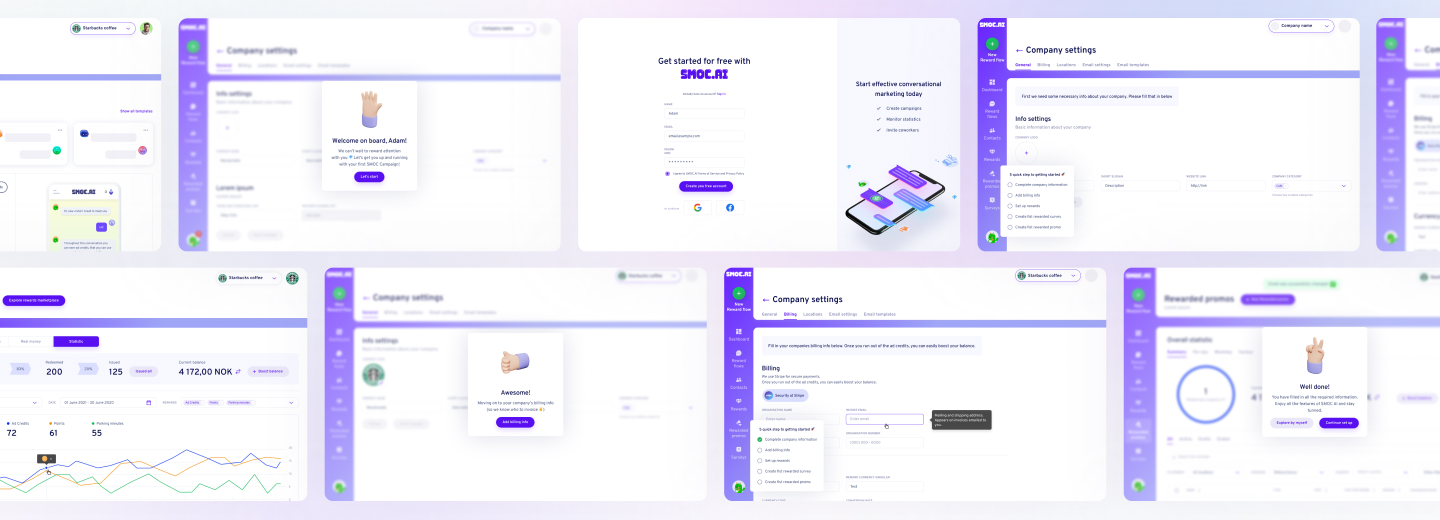The traditional software development process is often cumbersome, consuming valuable time and resources that startups cannot afford. Nothing to say about startups that face mounting pressure to deliver innovative solutions rapidly.
Low-code development platforms emerge as a transformative solution, empowering startups to streamline their creation process, minimize developmental complexities, and bring ideas to fruition swiftly with tangible results, even without extensive coding expertise.
Find in our article what is a low-code development environment, it’s processes and peculiarities that can bring transformation to your startup development process.
what’s in the article
- What is Low-Code Development?
- Why Low-Code Development Matters for Startups Development
- Benefits of Low-Code Development for Startups
- What Types of Startups Benefit from Low-Code Development?
- How Low-Code Development Simplifies the Startup Development Process
- Popular Low-Code Development Platforms for Startups
- How valuable is low-code development for long-term use?
- Low-Code Security Considerations
- Conclusion
What is Low-Code Development?
Low-code development services is a development approach that accelerates the process of application creation, minimizing the need for manual coding, and quality assurance introducing. Primarily, low-code development refers to a software development methodology that uses a graphical user interface to design applications. It allows developers and non-developers to build software quickly without diving deep into complex programming but instead operating visual blocks.
This paradigm shift means that startups can access robust application development tools and resources, often previously restricted to larger organizations with plentiful resources. By delivering visual development environments, they lower the technical barriers for entry, enabling startups to fuel their ideas and scale their operations with limited resources and manpower.
Why Low-Code Development Matters for Startups Development
Low-code development provides the competitive advantage startups need to excel with innovation, swiftness, and agility amidst industry challenges. Regulated, traditional approaches fall short of meeting the diverse demands and constrained timelines faced by startups.
Thus, adopting low-code sometimes becomes a strategic solution and opportunity, integrating seamlessly with evolving business models and operating realities. This approach facilitates an unprecedented level of collaboration between business and technology, empowering teams to transcend traditional development cycles while maintaining quality, consistency, and visionary execution.
Benefits of Low-Code Development for Startups
Low-code development propels startups into a world of accelerated innovation, where agility and speed converge to create groundbreaking solutions. By reducing complexities and empowering non-developers, startups can quickly iterate and launch products, gaining a vital competitive edge and cross-functional collaboration.
Rapid Development Process
Startups leveraging low-code can achieve faster time-to-market as low-code development dramatically accelerates the creation and deployment of software applications. This streamlined approach reduces bottlenecks and focuses on innovation rather than complex coding tasks. By empowering teams to prototype and iterate quickly, startups can better respond to market demands. This agility ensures long-term success and a significant leap in business value creation.
Faster Time-to-Market
Low-code platforms enhance the process of startup development by significantly reducing time constraints. This accelerated development cycle ensures startups can launch their products or services quickly. For entrepreneurs, the power of low-code means that the initial ideas can be transformed into market-ready solutions in a fraction of the time. It provides ambitious startups with the tools they need to iterate rapidly and trial their innovative ideas, even without extensive technical knowledge.
Budget Saving
Cost-effectiveness becomes the advantage when leveraging low code development platforms. With reduced dependence on specialized developers, low-code platforms offer startups a universe of possibilities at a fraction of traditional development costs. Businesses can allocate resources effectively, optimizing budgets without sacrificing quality, innovation, or the exploration of new ideas.
Furthermore, the economic landscape for startups is often fraught with tight margins; thus, the strategic allocation of capital becomes essential. By using low-code development, startups can significantly cut down both development and maintenance expenses, allowing for a broader allocation of resources to other critical areas such as marketing, sales, or customer experience enhancement.
Empower Non-Technical Teams
Low-code development environment is transforming how non-technical teams contribute to startup innovation. It fosters greater collaboration, creativity and problem-solving by enabling seamless interaction between technical and non-technical team members.
This, in turn, enhances creativity, allowing individuals to experiment and generate ideas without the limitations of traditional coding. The result is faster iteration, as ideas can be rapidly prototyped and tested. This is made possible by accessible tools with user-friendly interfaces that require minimal technical expertise. Through intuitive, drag-and-drop functionalities, low-code platforms empower non-technical personnel to develop software unavailable to production without coding before.
Simplifying Communication
Low-code development fundamentally transforms how startups communicate, both internally within their organization and with their wider ecosystem. By using visual interfaces and pre-built templates, complex concepts become accessible to all team members, regardless of their technical expertise.
This approach fosters a more inclusive dialogue, where every participant feels comfortable engaging in the conversation. As business and technical stakeholders communicate more effectively, strategic planning becomes more seamless. Which results in accelerated decision-making processes and enhanced project cohesion. Furthermore, low-code development reduces dependency on lengthy documentation, allowing more time to be spent on impactful collaboration.

Looking to Build an MVP without worries about strategy planning?
EVNE Developers is a dedicated software development team with a product mindset.
We’ll be happy to help you turn your idea into life and successfully monetize it.
What Types of Startups Benefit from Low-Code Development?
Startups aiming to disrupt traditional industries or introduce innovative tech solutions (particularly those in fintech, health tech, and edtech) demand agility and speed, so they will get the most benefit from such solutions. They can swiftly prototype, test, and iterate applications, aligning product offerings with evolving customer needs while maintaining a competitive edge.
Additionally, startups with limited in-house coding expertise can use intuitive drag-and-drop interfaces to rapidly launch their products and services without the bottleneck of conventional development processes. Beyond this, early-stage startups focusing on personalized customer experiences find remarkable value.

Proving the Concept for FinTech Startup with a Smart Algorithm for Detecting Subscriptions

Scaling from Prototype into a User-Friendly and Conversational Marketing Platform
How Low-Code Development Simplifies the Startup Development Process
Navigating the complex startup landscape can be daunting, yet there lies a pathway of unprecedented innovation, thanks to low-code development. These platforms revolutionize the way entrepreneurs approach creating software, allowing ideas to blossom into actionable prototypes more swiftly than ever, empowering startup teams to focus on refining strategic visions and accelerating time-to-market without being stalled by traditional coding methodologies.
Managing Rapid Growth
For startups experiencing rapid growth, strategic foresight and adaptable methodologies are essential to maintain momentum. Implementing scalable solutions, such as systems that grow with business demands, is crucial to avoid productivity bottlenecks. Prioritizing resource allocation, particularly investments in robust technology and talent, is necessary to sustain expanding operations without compromising quality. Regularly refining workflows through process optimization ensures operational efficiency keeps pace with increasing scale and complexity.
Moreover, leveraging personalized experiences helps retain and satisfy evolving customer bases. In this context, low-code development platforms offer valuable, adaptable, and scalable technological solutions. These platforms empower startups to continually innovate without the complexities of traditional coding.
Faster MVP Creation
Low-code development for startups provides an unparalleled advantage in creating Minimum Viable Products quicker than ever imagined. By leveraging visual interfaces and prebuilt modules, startups can sidestep the complexities of traditional development. This strategic approach accelerates product testing and idea validation within days.
Low-code platforms empower startups by facilitating iterative development processes, allowing for a suite of iterative refinements and enhancements. Most importantly, this expedited development cycle propels startups from mere ideas to market-ready solutions, minimizing time to market drastically.
Simplified Updates
Low-code development fundamentally changes how startups manage software updates and enhancements, streamlining the process significantly. Real-time modifications allow changes to be implemented without extended downtime. The modular architecture facilitates seamless and flexible addition of features or components. Drag-and-drop interfaces minimize the need for extensive coding expertise during updates. Furthermore, automated testing routines ensure stability and functionality with each update. These combined benefits minimize disruption, optimize resource allocation, and maintain focus on core business objectives.
Scalability
Low-code development platforms are crafted with scalability at their core. This means that as your startup grows, your software infrastructure can seamlessly grow with it. The elasticity of low-code solutions allows you to respond agilely to increased demands, ensuring that your application’s performance remains robust and reliable. Consequently, startups are empowered to handle larger user bases without the fear of overwhelming their systems.
As user demands increase, be it spikes or steady growth, low-code platforms rise to the occasion – enabling startups to shift resources seamlessly as they scale – ensuring consistent performance and uninterrupted service delivery. This inherent scalability of low-code platforms presents a strategic advantage for startups poised for growth.

Need Checking What Your Product Market is Able to Offer?
EVNE Developers is a dedicated software development team with a product mindset.
We’ll be happy to help you turn your idea into life and successfully monetize it.
Popular Low-Code Development Platforms for Startups
By finding out what is a low code platforms, startups recognize that these platforms provide structured environments, ensuring innovative ideas translate into tangible applications without delay, thus an essential asset for rapid entrepreneurial success.
OutSystems
OutSystems stands as a formidable player in the low-code arena, offering startups the tools necessary to unleash their potential. This platform integrates robust tools for AI-driven automation—perfect for startups focused on cutting-edge innovation.
In addition to scalability, OutSystems offers an array of customization options, furnishing startups with the flexibility they need. This adaptability guarantees that the unique needs and goals of a diverse range of businesses are met effectively and eloquently.
Mendix
Mendix is a cutting-edge low-code development platform that empowers startups by simplifying and streamlining application creation. Its intuitive drag-and-drop interface simplifies the design process using a visual approach. Robust integration capabilities allow seamless connection with various systems and databases. Built-in scalability ensures applications can grow alongside business needs.
A comprehensive toolkit provides extensive resources for both business and IT collaboration. This platform effectively bridges the gap between business ideas and technical execution, enabling startups to innovate with greater agility.
Bubble
Bubble allows startups to craft complex web applications with ease through their tool. Its no-code design philosophy removes the barriers of traditional development, making it possible for entrepreneurs to focus on their innovation rather than the intricacies of code. It provides startups with the agility to adapt, iterate, and thrive amid evolving market dynamics and customer needs. With Bubble’s features, startups can experiment with ideas, validate them, and make data-driven decisions without cumbersome overheads.
AppGyver
Developer-driven yet user-friendly, this platform empowers startups and professionals to forge complex applications swiftly, circumventing traditional coding intricacies. AppGyver has unique capability to seamlessly integrate with a diverse range of data resources. AppGyver offers a distinct edge in enabling rapid prototyping and validation for startups.
How valuable is low-code development for long-term use?
Low-code development empowers startups to significantly streamline the creation process and optimize resource allocation effectively. Incorporating low-code development into startup strategy enhances operational efficiency and accelerates time-to-market. It provides scalability, supporting both immediate project needs and future expansion, thus proving indispensable in dynamic environments.
Moreover, the collaborative nature of low-code platforms fosters cross-functional synergy. This empowers diverse teams to contribute to application development, aligning closely with long-term business goals.
Low-Code Security Considerations
As platforms evolve, ensuring robust security becomes criticalin terms what is a low code solution. The speed and accessibility of low-code development for startups require vigilant assessments of inherent security vulnerabilities. Consequently, stakeholders must consider the nuances of implementing these solutions while remaining vigilant in their practices.
Choosing secure low-code tools bolsters these protective measures. A thorough evaluation of vendor capabilities – not just their current offerings but also their commitment to future security advancements – is essential. This includes understanding their post-deployment support mechanisms and integrating third-party security standards.
Conclusion
Low code interface development is a powerful tool for startup product development growth and innovation as it brings a completely new experience to the development process. This allows startups to focus on their core mission, reduce time-to-market, and leverage a flexible and collaborative development environment.
With low-code technologies, startups bring industry trends to their processes and gain a distinct competitive advantage by delivering impactful solutions swiftly and efficiently. In doing so, they not only drive their own growth but also contribute to a dynamic ecosystem that nurtures creativity and forward-thinking developments and promote what is a low code developer.
Suitability varies based on the startup’s technological needs, industry requirements, and growth aspirations. Startups rooted in specialized technological domains or scaling at significant velocity may need more comprehensive, bespoke development. Other more commonly simple early-stage ventures may benefit from such an approach.
Low-code platforms are inherently designed for integration, offering seamless connectivity to a wide range of existing tools and systems. APIs facilitate connections with external services, data feeds, and applications. Integration with various database systems, including SQL, NoSQL, and cloud databases, enables centralized data management. It is also possible connecting with third-party applications like CRM, ERP, and other specialized business tools. Integration with major cloud services like AWS, Azure, and Google Cloud enables scalable solutions.
In case what is low code is the secret to you, consider the technical expertise within your team to ensure ease of adoption. Assess the scalability and flexibility of prospective platforms, ensuring they can grow with your startup’s dynamic needs and support your strategic vision with flexible low code development meaning.

About author
Roman Bondarenko is the CEO of EVNE Developers. He is an expert in software development and technological entrepreneurship and has 10+years of experience in digital transformation consulting in Healthcare, FinTech, Supply Chain and Logistics.
Author | CEO EVNE Developers


















